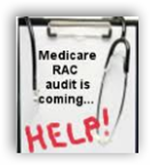This of course means higher administrative costs and the claim audits are automated so this means transactions. Hospitals might have to beef up their auditing software to ensure coding and billing is compliant. Boy everyone you talk to today hates coding and it is a nightmare as some items are not always black and white. Enough mistakes can put one in the hole pretty quickly. 
Recent changes from CMS have made more claims available to audit and the same claim can be checked for multiple items. The RACs get paid a percentage on what they find thus they are looking for large dollar amounts. As you can read below the amount of denied claims doubled. The values range between $399 for an automated find and up to over $5000 for a complex claim. I wonder what is going to happen when the ICD-10s kick in as the article points to ICD-9 coding as being one of the largest areas audited. Will there be room for the initial learning curve and data mapping? BD
With Medicare recovery audit contractors racking up more claims denials, hospitals are forced to put more time and energy into improving their claims-processing track record.
After a relatively easy 2010, "hospitals will be stretched for resources in 2011," says Dennis Jones, director compliance services for CBIZ KA Consulting Services, based in East Windsor, N.J. "It's going to be really tough."
More volume, more money on the line
The four Medicare RACs started automated reviews in 2009 and complex reviews in 2010. By the end of 2010, the value of RAC denials was burgeoning. The AHA's RACTrac survey reported the value of denials doubled from $42 million in the third quarter of 2010 to $86 million in the fourth quarter.
One reason for the leap in the value of denials is the RACs' switch from automated to complex denials, which are thirteen times more expensive. The latest RACTrac survey valued automated denials at $399 per claim and complex denials at $5,281 per claim.RACTrac reported that $1.7 billion in Medicare payments were targeted for medical record requests through the fourth quarter of 2010. "The volume of claims and coding for Medicare alone is just unbelievable," says Gloryanne Bryant, regional managing director of HIM and co-chair of the RAC Committee for Kaiser Northern California. "With these levels, how can providers not make mistakes?" Therefore, hospitals have to be all the more careful in how they handle claims, she says.
Connolly Consulting, known as the most aggressive RAC and the one that other RACs often emulate, has been posting hundreds of new issues on its website. Connolly, which covers Region C, mostly in the South, posted 35 new issues in September, 77 new issues in January and an omnibus issue in March that dealt with 309 MS-DRGs and 141 ICD-9 diagnosis codes. Since the postings frequently refer to ICD-9 codes, it takes some detective work to figure out what DRGs might be involved and precisely what the RAC is looking for in each DRG, says Ernie de los Santos, chief information officer for eduTrax.
"The RACs do not want to show you their hand," Mr. de los Santos says. "If they explained exactly what they are doing, hospitals would be prepared for them and they wouldn't make any money." He says RACs are essentially "bounty hunters," getting a contingency fee of 9-12 percent on any overpayments.
As Denials Rise, Hospitals Working Harder to Fend Off RACs | RACs / ICD-9 / ICD-10



0 comments :
Post a Comment